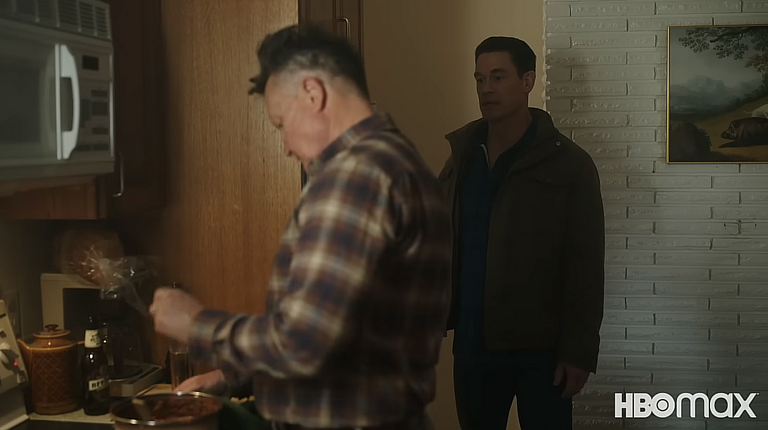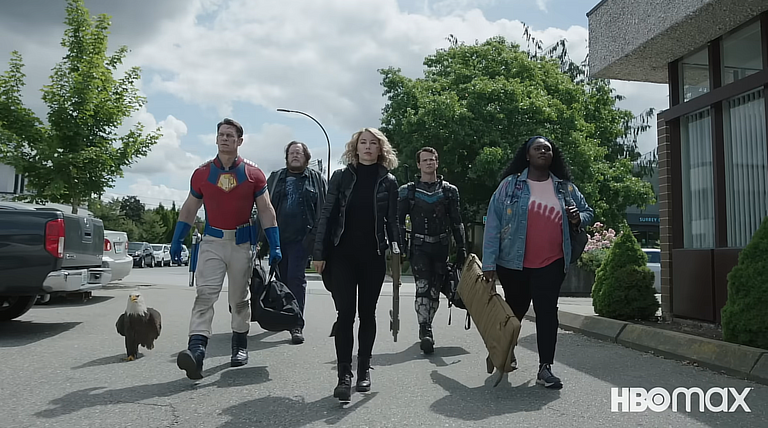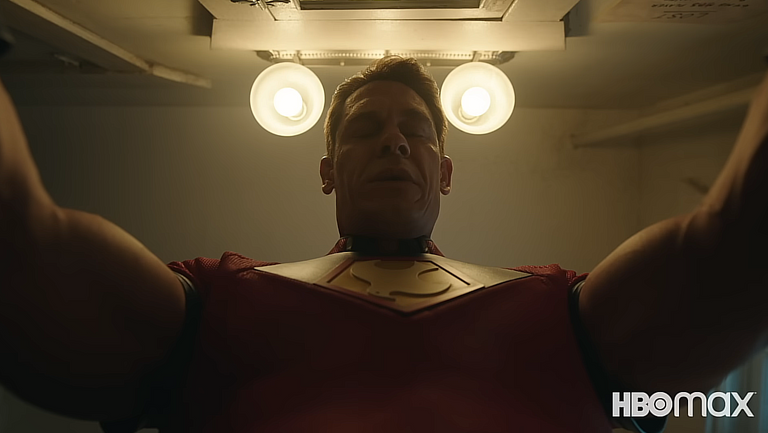[ENG]
With Peacemaker, James Gunn has decided to try his hand at serial storytelling, exceeding himself and all our expectations. The series debuts in January 2022 on HBO Max and follows the events of The Suicide Squad (James Gunn, 2021).
Christopher Smith aka Peacemaker, again played by the amazing John Cena, is once again involved in a secret task force that must investigate a potential threat to the US government.
Again James Gunn exploits the simplicity of a plot to focus on characters, emotionality and empathy. Smith is a hitman with decidedly questionable political and social ideas, which Gunn's mad, sensitive pen contaminates with insecurities and 'daddy issues'.
Peacemaker is not what you expect, but when it ends you realise that he is the only hero who embraces contemporaneity, generations old and new: a traumatic hero who experiences the psychological drama of abandonment, loneliness and vulnerability.
Our hero seems the archetype by definition of the macho hero: inflexible, precise, with an impeccable physique and, above all, invulnerable. The typical 'real' man who bends to nothing, never cries, never sings, never indulges his emotions and, certainly, never dances.
He behaves this way because it is the upbringing he received from his father August Smith/White Dragon (Robert Patrick), once a notorious criminal with conservative ideologies to say the least. He raised his sons according to the principles of manly stoicism. Christopher in particular, however, no longer feels comfortable in the role of the indefatigable and tireless hero, the remorseless killer. Peacemaker feels lonely, insecure and is trying to change. The highly conflicted relationship with himself and the father figure is a common thread throughout the script.

The series asks these questions: what if a man no longer wants to be strong, because all the traumas he has not processed have broken him down to the core?
For James Gunn, it is not just a question of deconstructing a character, but an entire definition.
Why should the hero, the saviour, the man to be such have to give up dancing or crying? Who drew the line between male and female attitudes? Why has that line traumatised entire generations, and to what extent?
Absent fathers, or with a claim to masculinity, strength and integrity that nowhere is it written that men should have. No weaknesses can be shown, on pain of disrespect and paternal pride. Finally, the consequent loss of self.
These are all attitudes and demands that are detrimental to a man's growth (here understood as a human being), wounds that he will carry forever and that will compromise his relational possibilities. Peacemaker, in fact, has sexual relations just for the sake of it, but without feeling anything. He goes so far as to do drugs in order to get rid of the pain he feels. This series has no production limits, so it has no mercy.
These are the contrasts with which James Gunn strikes straight to the heart, reminding you of open wounds that you never thought were still bleeding. Still, not all the evil in us is our own fault, and we should not be afraid to discover ourselves in tears.
As even the myth already said, you have to face your fathers (as a generation), kill them if you have to, and once you have atoned for their sins you move on to the hardest part: forgiving yourself.
Christopher is an extraordinarily contradictory figure, ironic and in his own way tender. He hates himself, he hates his father for making him what he is, but neither would he want to hurt or disappoint him. Despite everything he is still that child seeking approval.
Peacemaker - 11th Street Kids
James Gunn always talks about misfit figures, discriminated against because of a physical or character trait (from skin colour to weight, from a grumpy attitude to sexual orientation) and articulates their deep discomfort, their inner sadness. Even a smart and handsome agent like Harcourt experiences that anxiety, which falls on her from the top and from society, of always having to be this way, always living up to expectations.
Peacemaker does not have to question himself and his life alone. Even he finds a 'family' in which he feels welcome, despite everything. He even falls in love, allows himself this vulnerability, even though he knows himself to be a monster and is aware that he has everything to lose.

He and his group are, in reality, the boys and girls of every school and age who live between fear of judgement from others and outright bullying. They are wonderfully flawed and victims of their emotions, because no one has taught them how to relate to them.
The great ability of the director of The Suicide Squad is to write memorable characters, often for stupidities. It is, in fact, attention to detail, such as the repeatedly repeated joke about the dyed beard of John Economons (Steve Agee) that we can hear from the very first episode and which returns in the finale in the most unpredictable and poignant of scenes.
The imperfections are those fundamental little things that help us relate to these characters. And we can guarantee that all of them, both main and secondary, are full of delightful eccentricities, absolutely ordinary and everyday, or totally out of their minds: this is their strength.
Just think of the scene in which we are outlined, without half dialogue, what the real relationship is between Peacemaker and Adrian Chase aka Vigilante (Freddie Stroma), a kind of sidekick totally incapable of doing his job (which is why you learn to love him): the two are in a forest shooting broken appliances for fun, all in slow motion and with a rock cover by Santa Cruz of One Direction's Drag Me Down. They may not always get along, but the two are bonded by this hobby, for outsiders that makes them.
Peacemaker - The possibility of fragile heroism

James Gunn's heroes are capable, but hardly ever endowed with special powers. They are certainly not as charismatic or indefatigable as many DC and Marvel favourites. That scene in the last episode stands in a cultural discourse. "You're too late, assholes" is a phrase that speaks to all those elites and generations in power who have handed down an idea of heroism that is deeply bogus and far removed from human possibilities. The great Hollywood narratives are on the wane. We can still look for the fearless knights of the western, the great villains and epic charges to the shout of "Avengers unite!", but it is not of that excellence that James Gunn writes. Nor, however, does he look to the desolation of Travis Bickle or the perdition of Llewyn Davis. We are in a narrative that stands in the middle, in the possibility of fragile heroism.
James Gunn is establishing himself as the author of heartbreak who still tries.
The director brings forward themes that have become part of his poetics, such as loneliness and insecurities, the conflicting relationship with parental figures, relationships with other (human or not) flawed beings, and the saving power of a hug or a dance. These are all elements that we can find as much in the two volumes of The Guardians of the Galaxy as in The Suicide Squad.
Whether we set aside heroism, or even anti-heroes, even they are far too good. We need mediocrity. We need losers, those who have lost something and know what it's like to feel abandoned. They will not be late, they will not take the people they have by their side for granted and they will always be there to save them. Between songs.
It is time for the magnificent and mythological figures to step aside, because there is no longer a need to be strong at all costs. There will be a time for strength, but it is time for us to make room for weaknesses, so easily forgotten.
The new hero dances in his underwear to the melancholic notes of 80s ballads and sings using a pelvic vibrator as a microphone.
The photos have been taken from individual images from the trailer, available for free on YouTube or other sites.
[FR]
Avec Peacemaker, James Gunn a décidé de s'essayer à la narration en série, se dépassant lui-même et dépassant toutes nos attentes. La série débute en janvier 2022 sur HBO Max et fait suite aux événements de The Suicide Squad (James Gunn, 2021).
Christopher Smith alias Peacemaker, de nouveau interprété par l'incroyable John Cena, est de nouveau impliqué dans un groupe de travail secret qui doit enquêter sur une menace potentielle pour le gouvernement américain.
Une fois de plus, James Gunn exploite la simplicité de l'intrigue pour se concentrer sur les personnages, l'émotivité et l'empathie. Smith est un tueur à gages aux idées politiques et sociales résolument discutables, que la plume folle et sensible de Gunn contamine d'insécurités et de "problèmes de père".
Peacemaker n'est pas ce à quoi on s'attend, mais à la fin, on se rend compte que c'est le seul héros qui embrasse la contemporanéité, les générations anciennes et nouvelles : un héros traumatique qui vit le drame psychologique de l'abandon, de la solitude et de la vulnérabilité.
Notre héros semble être l'archétype par définition du héros machiste : inflexible, précis, au physique impeccable et surtout invulnérable. Le "vrai" homme typique qui ne se plie à rien, ne pleure jamais, ne chante jamais, ne se laisse jamais aller à ses émotions et, surtout, ne danse jamais.
Il se comporte ainsi parce que c'est l'éducation qu'il a reçue de son père August Smith/White Dragon (Robert Patrick), un criminel notoire aux idéologies pour le moins conservatrices. Il a élevé ses fils selon les principes du stoïcisme viril. Christopher, en particulier, ne se sent plus à l'aise dans le rôle du héros infatigable et infatigable, du tueur sans pitié. Peacemaker se sent seul, peu sûr de lui et essaie de changer. La relation très conflictuelle qu'il entretient avec lui-même et avec la figure paternelle est un fil conducteur tout au long du scénario.

La série pose ces questions : que se passe-t-il si un homme ne veut plus être fort, parce que tous les traumatismes qu'il n'a pas traités l'ont brisé jusqu'à la moelle ?
Pour James Gunn, il ne s'agit pas seulement de déconstruire un personnage, mais toute une définition.
Pourquoi le héros, le sauveur, l'homme en devenir devrait-il renoncer à danser ou à pleurer ? Qui a tracé la frontière entre les attitudes masculines et féminines ? Pourquoi cette frontière a-t-elle traumatisé des générations entières, et dans quelle mesure ?
Pères absents, ou revendiquant une masculinité, une force et une intégrité qu'il n'est écrit nulle part que les hommes doivent avoir. Pas de faiblesses à montrer, sous peine d'irrespect et de fierté paternelle. Enfin, la perte de soi qui en découle.
Autant d'attitudes et d'exigences qui nuisent à la croissance de l'homme (entendu ici comme être humain), autant de blessures qu'il portera à jamais et qui compromettront ses possibilités relationnelles. Peacemaker, en effet, a des relations sexuelles juste pour le plaisir, mais sans rien ressentir. Il va jusqu'à se droguer pour évacuer la douleur qu'il ressent. Cette série n'a pas de limites de production, elle est donc sans pitié.
C'est avec ces contrastes que James Gunn frappe droit au cœur, vous rappelant des plaies ouvertes dont vous ne pensiez pas qu'elles saignaient encore. Pourtant, tout le mal qui est en nous n'est pas de notre fait, et nous ne devrions pas avoir peur de nous découvrir dans les larmes.
Comme l'a déjà dit le mythe, il faut affronter ses pères (en tant que génération), les tuer s'il le faut, et une fois qu'on a expié leurs péchés, on passe à la partie la plus difficile : se pardonner à soi-même.
Christopher est un personnage extraordinairement contradictoire, ironique et, à sa manière, tendre. Il se déteste, il déteste son père pour avoir fait de lui ce qu'il est, mais il ne voudrait pas non plus le blesser ou le décevoir. Malgré tout, il reste cet enfant en quête d'approbation.
Peacemaker - 11th Street Kids
James Gunn parle toujours de personnages inadaptés, discriminés en raison d'un trait physique ou de caractère (de la couleur de peau au poids, d'une attitude grincheuse à l'orientation sexuelle) et articule leur profond malaise, leur tristesse intérieure. Même un agent intelligent et séduisant comme Harcourt éprouve cette anxiété, qui lui est imposée par la hiérarchie et la société, de devoir toujours être comme ça, de toujours répondre aux attentes.

Peacemaker n'est pas le seul à se remettre en question et à s'interroger sur sa vie. Il trouve même une "famille" dans laquelle il se sent le bienvenu, malgré tout. Il tombe même amoureux, s'autorise cette vulnérabilité, alors qu'il se sait un monstre et qu'il est conscient d'avoir tout à perdre.
Lui et son groupe sont, en réalité, les garçons et les filles de toutes les écoles et de tous les âges qui vivent entre la peur du jugement des autres et les brimades. Ils sont merveilleusement imparfaits et victimes de leurs propres émotions, parce que personne ne leur a appris à les gérer.
La grande capacité du réalisateur de The Suicide Squad est d'écrire des personnages mémorables, souvent pour des bêtises. C'est en fait l'attention portée aux détails, comme la blague répétée à plusieurs reprises sur la barbe teinte de John Economons (Steve Agee) que l'on entend dès le premier épisode et qui revient dans le final dans la scène la plus imprévisible et la plus poignante.
Les imperfections sont ces petites choses fondamentales qui nous aident à nous identifier à ces personnages. Et nous pouvons garantir que tous, qu'ils soient principaux ou secondaires, sont pleins d'excentricités délicieuses, absolument ordinaires et quotidiens, ou totalement déjantés : c'est ce qui fait leur force.
Il suffit de penser à la scène où l'on nous décrit, sans demi dialogue, la véritable relation entre Peacemaker et Adrian Chase alias Vigilante (Freddie Stroma), une sorte de sidekick totalement incapable de faire son travail (c'est pourquoi on apprend à l'aimer) : les deux sont dans une forêt en train de tirer sur des appareils cassés pour s'amuser, le tout au ralenti et avec une reprise rock par Santa Cruz de Drag Me Down des One Direction. Ils ne s'entendent pas toujours, mais ils sont liés par ce hobby, qui fait d'eux des outsiders.
Peacemaker - La possibilité d'un héroïsme fragile

Les héros de James Gunn sont capables, mais rarement dotés de pouvoirs spéciaux. Ils ne sont certainement pas aussi charismatiques ou infatigables que de nombreux héros de DC et Marvel. La scène du dernier épisode s'inscrit dans un discours culturel. "Vous arrivez trop tard, bande de cons" est une phrase qui s'adresse à toutes ces élites et générations au pouvoir qui ont transmis une idée de l'héroïsme profondément fausse et très éloignée des possibilités humaines.
Les grands récits hollywoodiens sont sur le déclin. Nous pouvons toujours rechercher les chevaliers intrépides du western, les grands méchants et les charges épiques au cri de "Avengers unite !", mais ce n'est pas de cette excellence que James Gunn écrit. Mais ce n'est pas non plus vers la désolation de Travis Bickle ou la perdition de Llewyn Davis qu'il se tourne. Nous sommes dans un récit qui se situe au milieu, dans la possibilité d'un héroïsme fragile.
James Gunn s'impose comme l'auteur du chagrin d'amour qui tente encore.
Le réalisateur met en avant des thèmes qui font partie de sa poétique, comme la solitude et l'insécurité, la relation conflictuelle avec les figures parentales, les relations avec d'autres êtres (humains ou non) imparfaits, et le pouvoir salvateur d'une étreinte ou d'une danse. Autant d'éléments que l'on retrouve aussi bien dans les deux volumes des Gardiens de la Galaxie que dans Suicide Squad.
Que l'on mette de côté l'héroïsme, ou même les anti-héros, même eux sont bien trop bons. Nous avons besoin de médiocrité. Nous avons besoin de perdants, de ceux qui ont perdu quelque chose et qui savent ce que c'est que de se sentir abandonné. Ils ne seront pas en retard, ils ne prendront pas pour acquis les gens qu'ils ont à leurs côtés et ils seront toujours là pour les sauver. Entre les chansons.
Il est temps que les figures magnifiques et mythologiques s'effacent, car il n'est plus nécessaire d'être fort à tout prix. Il y aura un temps pour la force, mais il est temps pour nous de faire de la place aux faiblesses, si facilement oubliées.
Le nouveau héros danse en sous-vêtements sur les notes mélancoliques des ballades des années 80 et chante en utilisant un vibrateur pelvien en guise de micro.
Les photos ont été prises à partir d'images individuelle du trailer, disponibles gratuitement sur YouTube ou d'autres sites.
Congratulations @albator85! You have completed the following achievement on the Hive blockchain And have been rewarded with New badge(s)
Your next target is to reach 150 posts.
You can view your badges on your board and compare yourself to others in the Ranking
If you no longer want to receive notifications, reply to this comment with the word
STOPTo support your work, I also upvoted your post!
Check out our last posts:
Support the HiveBuzz project. Vote for our proposal!